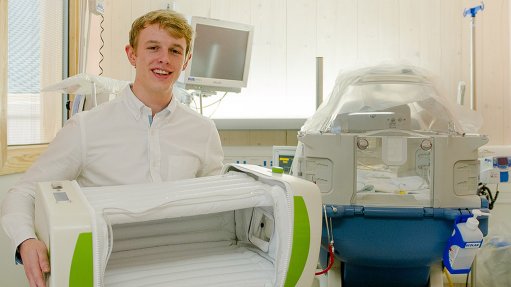
JAMES ROBERTS The MOM incubator was designed to help babies in developing nations who were dying in conflict-struck nations or who do not receive hospital care
A low-cost, inflatable incubator won this year’s international James Dyson design award, which aims to encourage and inspire the next generation of design engineers.
The winner was announced on November 6 and is recent Loughborough University graduate, twenty-three-year-old James Roberts, who designed an incubator, named MOM, to help babies in developing nations who were dying in conflict-struck nations or who do not receive hospital care.
The high-impact polystyrene incubator weighs less than 10 kg and, compared with conventional incubators, which cost about £30 000 each, or about R536 000, MOM costs only £250, or about R4 400.
MOM is inflated manually and heated using ceramic heating elements. A screen displays the temperature and the humidity, which can be custom set, depending on the gestation stage. An alarm sounds if the required temperature changes.
There is also a collapsible phototherapy unit that comes standard with the incubator and is used to treat babies suffering from jaundice.
“I watched a television programme about the situation in Syria and it explained that a lack of hospitals meant that a lot of babies were dying – so many that some people are talking about Syria’s ‘lost generation’. I thought there had to be a way of making the situation better,” he explains.
With no prior knowledge of incubators, Roberts consulted with experts, such as neonatal specialists in hospitals and doctors who had worked in refugee camps, as well as nurses who used incubators and a midwife.
MOM complies with British incubation standards and can use established supply lines. It can be folded when not in use to save space, which is an important advantage in areas that need aid.
The incubator is modular, thus allowing for the easy replacement of any broken parts. Roberts aims to make computer-aided design models of the parts available online so that they may be manufactured using three-dimensional printing.
“The design of MOM has removed everything that is unnecessary. Some incubators contain weighing scales. That is useful, but not necessary in the refugee camp scenario. The inflatable material is inexpensive, and I used simple computer fans and ceramic heaters, rather than more expensive components,” he says.
MOM has a layer of air built into the shell between the inside and outside layers, which is ideal for maintaining a constant heat.
Roberts will use his £30 000 prize for prototyping and he hopes to obtain approval from the relevant authorities to prove that his product is safe.
He hopes to spend time with manufacturers, lawyers and people working in the field. He also hopes to understand the various incubation rules that apply in different countries.
Roberts aims to manufacture MOM units by starting his own company and adds that he sees the opportunity for his incubator as technology advances.
He adds that winning the award has given his invention credibility, as people are not always open to new ideas from recent graduates.
Roberts adds that there has not been much innovation regarding incubators.
“I faced a lot of assumption that my idea couldn’t work. Being part of the James Dyson award has helped me overcome that. The public exposure has also been helpful in searching for investors,” he said.